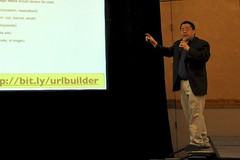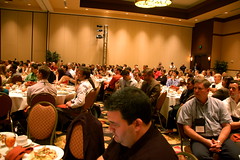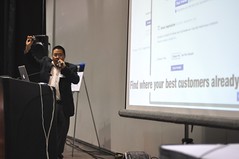5 old sales tricks made new again
Anyone ever take one of the old sales trainings from back in the day – Zig Ziglar, Tom Hopkins, etc.? There were tons of interesting tips and tricks for sales folks from a time when sales people had to work insanely hard with terrible tools (or no tools at all) and still make their numbers. No Salesforce.com or Zoho CRM to remind you who you forgot to call, no social media or SEO to bring prospects to your door, nothing but your leather binder, day planner, telephone, and a suit & tie.
Some of the tricks from those old trainings can be modernized, though, and some can be brought back as huge differentiators in the digital world. Here’s a few:
 1. Thank you cards. This is something Ziglar was absolutely punishing on. You had to send thank you cards. No surprise, in the age of electronic automation of everything, a handwritten thank you card to a closed sale makes a huge impression because it’s so out of the ordinary.
1. Thank you cards. This is something Ziglar was absolutely punishing on. You had to send thank you cards. No surprise, in the age of electronic automation of everything, a handwritten thank you card to a closed sale makes a huge impression because it’s so out of the ordinary.
2. Thinking about you. Want to know a really silly simple trick to stay top of mind with someone you’re trying to win over? Set up a Google alert for their top SEO term (check their web site, and if it looks like they have no SEO, take your best guess) and then when news articles and alerts pop up in Alerts, check them for quality and forward them. Back in the day, Hopkins would recommend taking the local newspaper and sending clippings to prospects. Google Alerts and Google Reader make that much, much simpler.
3. Thinking about you part 2. “Remember that a person’s name is to that person the sweetest and most important sound in any language.” -Dale Carnegie. Monitor your best prospects and their company names and send them stuff about them as you can. There are actually paid services that do nothing but clip stuff out of papers and magazines and try to resell it to you at obscene prices, especially after you’ve won an award. “Wouldn’t you like a nicely framed version of your article?” crap. Do it yourself for your best prospects. If there’s someone you want to blow away, frame it yourself and send it over for free. For everyone else, send them at least an electronic “clipping”.
4. Fedex to the door. Email gets filtered. Postal mail gets shredded. Shipped boxes tend to get delivered and opened in case there’s something important inside. Got someone (Fortune 500 CEO, etc.) that you absolutely positively have to reach? Pay the $10 or so to ship a letter, CD, DVD, etc. via Fedex. Obviously, you’d only do this for a shot at a huge deal, but what a shot it makes.
5. Flip cam, iPhone cam, webcam. Back in the day, Hopkins would recommend trying to record yourself on the phone in a very awkward manner by holding a giant tape recorder (does anyone even remember those) up while you spoke so that you could listen to yourself on a call. These days, recording technology is incredible. Make use of it. Set up a little Flip cam, phone camera, whatever you’ve got that can record audio and video, then watch and listen to yourself on the phone. This is killer for public speakers too – don’t record just yourself! If budget and venue permit, record your audience and watch how they react. If you call using services and software like Skype, you can record both sides of the conversation (make sure you notify the person you’re talking to as it’s illegal to do so otherwise in some states).
There’s no shortage of old ideas that can be made new again if you’re willing to do some creative thinking and apply them to the best practices of yesteryear for results today. As my teacher Mark Davis of the Boston Martial Arts Center says, “on ko chi shin” – study something old to learn something new.
Did you enjoy this blog post? If so, please subscribe right now!
Get this and other great articles from the source at www.ChristopherSPenn.com! Want to take your conference or event to the next level? Book me to speak and get the same quality information on stage as you do on this blog.



 Do you ever ask these questions?
Do you ever ask these questions? The flip side of the coin is that we tend to become the company we keep. If we surround ourselves with bitter, angry, uninspiring people who do nothing but urinate into our mental pool, we go that route too – and unlike positive, inspiring people, it doesn’t take much. As Tony Robbins once quipped, you don’t need to drink a gallon of poison to have an effect – just a little is more than enough.
The flip side of the coin is that we tend to become the company we keep. If we surround ourselves with bitter, angry, uninspiring people who do nothing but urinate into our mental pool, we go that route too – and unlike positive, inspiring people, it doesn’t take much. As Tony Robbins once quipped, you don’t need to drink a gallon of poison to have an effect – just a little is more than enough. Where the martial arts (good ones, anyway) differ is the continued emphasis on the basics. We learn the basics but constantly revisit them to refine our understanding and improve them. As our basics get stronger, the “advanced” material (which is comprised of basics strategically arranged and put together) improve as well. Because advanced material relies on the basics, if we stop refining them, our advanced skills and techniques suffer as well.
Where the martial arts (good ones, anyway) differ is the continued emphasis on the basics. We learn the basics but constantly revisit them to refine our understanding and improve them. As our basics get stronger, the “advanced” material (which is comprised of basics strategically arranged and put together) improve as well. Because advanced material relies on the basics, if we stop refining them, our advanced skills and techniques suffer as well.
 … until the first thing out of their mouth at the proposal stage is a price objection. “It’s too expensive” or a variant of that phrase. Rather than cutting your prices immediately (which is the most common tactic for a rookie salesperson), get specific.
… until the first thing out of their mouth at the proposal stage is a price objection. “It’s too expensive” or a variant of that phrase. Rather than cutting your prices immediately (which is the most common tactic for a rookie salesperson), get specific. I read with great interest about another company forsaking email marketing – this time, ice cream maker Ben & Jerry’s. Good. Thank you very much!
I read with great interest about another company forsaking email marketing – this time, ice cream maker Ben & Jerry’s. Good. Thank you very much! I’ve been shopping around the past few days for a terrific lead automation system for the day job, looking at all of the different vendors out there. One thread that’s been common among all of the comparison discussions on LinkedIn, on blogs, etc. that baffles me is this argument:
I’ve been shopping around the past few days for a terrific lead automation system for the day job, looking at all of the different vendors out there. One thread that’s been common among all of the comparison discussions on LinkedIn, on blogs, etc. that baffles me is this argument: I’ll be doing a webinar on July 23 at 2 PM Eastern on 21st century email marketing, put on by my employer,
I’ll be doing a webinar on July 23 at 2 PM Eastern on 21st century email marketing, put on by my employer,